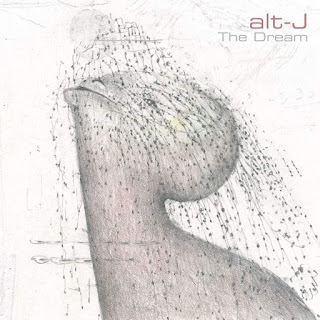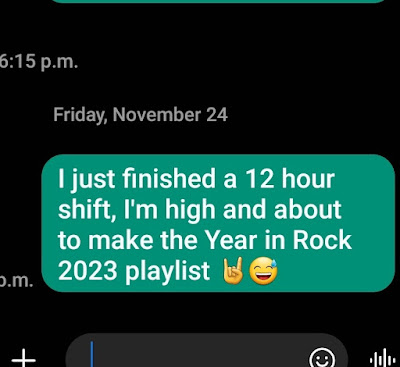IN REVIEW: Alt-J - "The Dream"
It's been just under a decade now since Alt-J burst onto the scene, armed with a tidal wave of Great British Hype and backed up by their own art school ostentatiousness; An Awesome Wave thrilled indie critics eager for the chance to break the next Arcade Fire, and their impressive (albeit somewhat try-hard) debut went on to earn them a rabid fanhood and the 2012 Mercury Prize (Britain's annual award for Best Album) and the prestige that comes with it. They followed it up two years later with This Is All Yours, which saw them diving headfirst into their dullest pretenses and making a begrudging concession to their American label; Left Hand Free, at first spoken of disparagingly by its creators, would be more accepted by the band once it became a hit, helping to sell a record that wouldn't be nearly as easy to sell without it and culminating with a Grammy nomination and a headlining gig at Madison Square Garden. For their next trick, 2017's Relaxer, they were a little more keen to push in any direction they wanted, resulting in an album that only succeeded in confusing the listener more often than thrilling them (although they did include In Cold Blood, my personal favourite single of theirs and another medium-sized hit, with minimal complaint).
Where this left the trio must have felt just a little precarious, straddling the line between the book-learned indie cred and critical acceptance they so longed for and the glitzy temptations of that sweet, sweet crossover appeal. They had already become indie darlings with their debut, flown too close to the sun on their sophomore effort, and followed their every fit of fancy on the prototypical difficult third album. Now, they were standing at a crossroad, and creating a pivotal fourth album. With a wait of nearly five years between records, this album carries the implication of a new chapter, defining the next phase of the beloved band; so, where (and how far) were they willing to go this time?
The Dream opens with the sound of a can opening and a voice over exclaiming "cold and sizzling" before the narrator takes a long, satisfying sip. Odd. A choir shows up, joining Joe Newman on the bluesy, opening refrain of "I sold my soul... for a sip at school... A swimming pool... ice cold black fuel". Okay? The song, from a musical standpoint, nails its dream-like ambitions, veering from hazy psychedelia through gospel jazz to a piano and breakbeat section that throws off similar vibes as the theme to Succession. It's a lot of sonic window dressing for what amounts to a song about the dream where you're swimming and drinking your way out of a pool full of cola (you know the one, we've all had it, right?), but Alt-J have never shied away from a baffling concept and the desire to make it bigger; the song even boasts a choir-lead bridge that addresses God directly in between more cans opening and fizzy liquid pours.
After such an odd start, we get a more successful experiment in the album's first single, U&ME; while they can't resist going a little extra on the overdubs and weird background noises, U&ME features a more straightforward approach thematically, waxing nostalgic about a summer holiday that gets a little sketchy but is nevertheless looked back on fondly; despite a few lyrical humdingers (such as "round of kimonos for my girls in the sun"), it turns out to be one of the most heartfelt moments in the band's discography to date.
We get back to the silliness on Hard Drive Gold, a bass-driven crossover hopeful from the Portugal. The Man textbooks that uses cryptocurrency mining as a euphemism for... nothing; it's a song about mining cryptocurrency, once again conscripting the youth choir to clap their hands and repeat, "Don't be afraid, afraid to make money, boy!". Then, it's back to the emotional stuff with Happier When You're Gone, a relatively straight-laced heartbreaker sung from the perspective of a lover cheated and ignored (set on a ranch, because reasons) that dares more than a passing glance at the mainstream appeal of, say, pre-pop obsessed Coldplay.
This is followed by the album's more laid back advance singles; The Actor, the most current single, uses an elastic vocal and a chilled, synth-laced mid-tempo number that returns to the pool, specifically "the deepest end of an empty" one (which is, metaphorically, filled with cocaine rather than cola. Meanwhile, the hushed and gentle Get Better closes out the album's first half by once again switching back to a more heartfelt mode with the narrator reminiscing about and, eventually, mourning the song's subject atop a sparse acoustic arrangement. It's the emotional centerpiece of The Dream, its loss and longing laid bare and being all the more effective for it.
The second half, for the most part, becomes a grand beige haze, melodies floating in and out of view among foggy sonic pastiches that are occasionally penetrated by an off-centre sonic detour, such as the slow build of Chicago into a techno/raver, the sweeping, operatic chamber pop outbursts of Philadelphia, or the unexpected summery, lovesick soul of closer Powders. Otherwise, the second half gets somewhat bogged down; Walk a Mile, the longest track on the album, is also the slowest and most lyrically trite, a combination that doesn't exactly beg repeat listens. Later, Losing My Mind moves just as lethargically while trying to build a tense, dark mood, ultimately sputtering out with barely more than a whisper outside its closing thirty seconds.
The Dream still shows great potential for Alt-J, and there's a higher success rate here than on their previous two records; it's just a little frustrating to hear a band that's still clearly having trouble determining the direction they want to go in. To give a somewhat modern comparison point, the situational vibe I get from Alt-J reminds me of what Cold War Kids were going through at about the same point in their career (and, to an extent, still do to this day); like Alt-J, Cold War Kids entered the chat with a highly acclaimed sound that ran counter to what the mainstream was made of at the time. Cold War Kids went through an awkward period from, say, their second through fourth records; at this point in their career, they were trying way too hard to appease both sides of the line, desperately attempting to maintain their status as critical darlings while their creative currents were pulling them to the raging waterfall of mainstream acceptance.
The Dream, to an extent, finds Alt-J in a similar position, one hand metaphorically gripped to an overhead branch as they gaze down the chasm, trying to evaluate the impact should they give in to the rushing waters. Fate stepped in for Cold War Kids in 2015, as First unexpectedly topped Billboard's alternative chart, becoming their most successful song and taking a lot of the stigma away from indie-minded bands who dared give in to their more emotionally direct and sonically melodic desires. What happens next for Alt-J is anyone's guess but, as the songs here prove, however, it sure feels like they're are at their best when they stop dreaming and start simply focusing on creating something real. Take your own advice, and don't be afraid to make money, boys.
February 11, 2022 • Infectious/Atlantic
Highlights U&ME • Get Better • Powders




Comments
Post a Comment